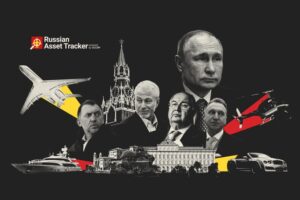A year on from Russia’s invasion of Ukraine, governments that have pledged to track down sanctioned Russian elites’ wealth must be publicly accountable about the measures they have taken – both individually and collectively, says Transparency International.
“Governments need to get more serious about targeting illicit wealth stashed within their borders, the group states. “They also need to collect and release the data in a more systematic manner, enabling civil society and the wider public to evaluate the impact of their efforts.”
 Experts are calling for a new approach to so-called “dekleptofication” – the process by which the U.K. might uncouple itself from wealthy foreign investment that originates in kleptocratic states, Tom Stocks of the Organized Crime and Corruption Reporting Project writes.
Experts are calling for a new approach to so-called “dekleptofication” – the process by which the U.K. might uncouple itself from wealthy foreign investment that originates in kleptocratic states, Tom Stocks of the Organized Crime and Corruption Reporting Project writes.
Since 2016, grassroots organization the Campaign for Legislation Against Moneylaundering in Properties by Kleptocrats, known as ClampK, has been visiting properties like these on what they call “kleptocracy tours.” Nowadays, however, these tours have added significance, he adds:

Credit: OCCRP
With many of these oligarchs now targeted by an intensive sanctions program launched in response to Russia’s aggression in Ukraine, some of their most valuable assets, like these mansions, have been frozen amid U.K. government efforts to clamp down on Kremlin-linked wealth…..Oliver Bullough, an investigative journalist and tour organizer, says from the front of the bus that it will take years of dedicated political will, robust legislation, and proper resourcing of law enforcement to reverse what he calls the “criminal foolishness” of having allowed dirty money to infiltrate the U.K.’s economy over the past few decades.
“By giving people a place to spend stolen money, we’re just encouraging them to steal more,” Bullough says. RTWT
The precise amount of money that has disappeared due to kleptocratic networks in Africa is unclear, writes Melissa Aten (@melissaaten) of the International Forum for Democratic Studies; however, the estimates are staggering. Brookings Institution research indicates that between 1980 and 2018, $1.3 trillion has been lost to illicit financial flows, of which kleptocratic money is a major component. In addition, UN Africa Renewal estimates that $88.6 billion is lost annually.
Watch the trailer for “Welcome to the #Kleptolands” (above) and corresponding short films about Angola, Equatorial Guinea, Republic of the Congo, Chad, and Cameroon, produced by Opening Central Africa (2022).

OCCRP
A bipartisan letter from 10 U.S. Senators calls on the Financial Action Task Force (FATF), an intergovernmental body that sets international anti-money laundering standards, to improve their latest ownership transparency proposal governing trusts and similar legal arrangements, which have been used to hide and move illicit assets by Russian oligarchs, drug cartels and human traffickers.
“The international order built on democracy, free markets, and the rule-of-law is under assault from autocracy, kleptocracy, and criminality,” wrote the Senators. “This assault has been fueled by opaque legal structures—such as anonymous trusts and other similar legal arrangements—created by the rule-of-law world, which provide sanctuary for the stolen wealth of the world’s worst actors.” A PDF of the letter is available here.
Experts have called for a new approach to so-called #dekleptofication – the process by which the U.K. might uncouple itself from wealthy foreign investment that originates in kleptocratic states, @occrp‘s @TREStocks writes. https://t.co/lj0KRXHbdE
— Democracy Digest (@demdigest) February 24, 2023







